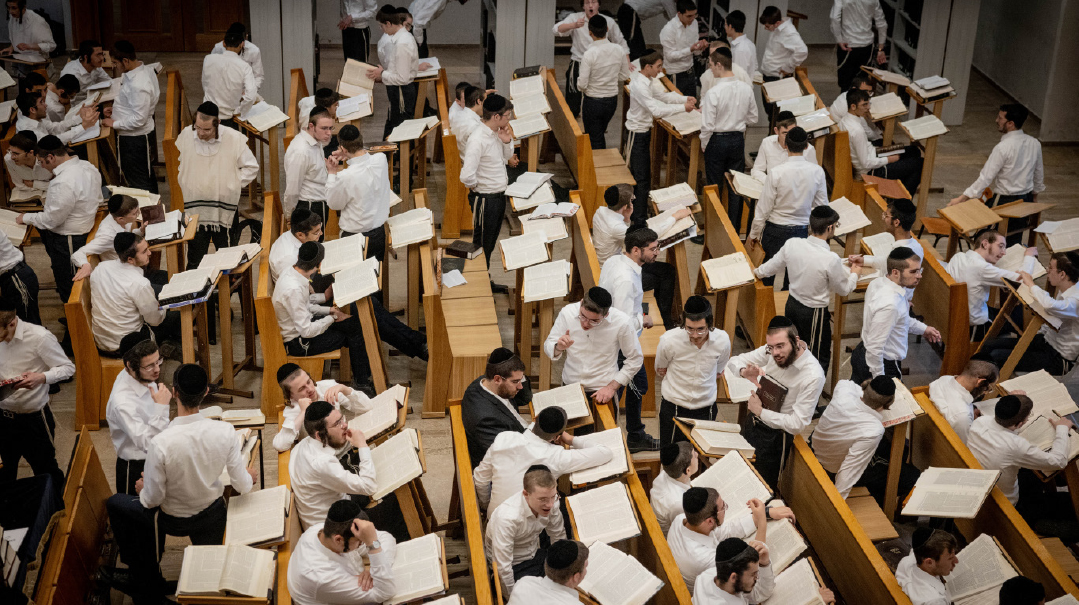Now More Than Ever
| November 21, 2023No breaks in fighting, no breaks in learning

T
he Midrash Rabbah in parshas Toldos tells us that the nations of the world approached Bilaam and asked, “Tomru she’nizdaveg b’umah zu — tell us if we can overcome this [the Jewish] nation.”
“Go check the batei knessios and batei medrash,” Bilaam responded. “If children are learning and davening, we cannot overcome them. For this is what their Father guaranteed them. When there is a kol Yaakov, there are no yedei Eisav. When there’s no kol Yaakov, there are yedei Eisav.”
The message for us is clear: During this time, we must do everything we can to strengthen the kol Yaakov. I told my talmidim that the soldiers don’t take breaks while they’re fighting. So, too, we cannot take breaks when we’re learning. We must be moser nefesh for limud haTorah just as the soldiers are being moser nefesh in their battle.
The truth is that we have several ways to tap the power of the kol Yaakov. I recently received a call from a fellow in the Five Towns. He knows that in my yeshivah, the bochurim have a six-hour seder after the Friday night seudah.
“I would like to sponsor food for after the seder,” he said. “That way, the bochurim will learn better during those six hours.”
This is a very beautiful story. First of all, as is well known, one who supports Torah has a chelek in the Torah that is learned. Zevulun is a partner with Yissaschar in his Torah. But there’s more to it than that. This Yid showed what is important to him. He showed that he values the kol Yaakov. And that, in itself, is mechazek the kol Yaakov. It’s our way of showing Hashem, “Look! Look what Klal Yisrael cares about! We care about Torah! We care about the kol Yaakov!”
When it comes to supporting Torah, it is a mistake to think that your support is only about quantity — that it must result in more hours of limud haTorah. Simply by allowing lomdei Torah to have more menuchas hanefesh, or by giving them a sense of pride by showing that you respect what they are doing, this, too, is hachzakas haTorah.
We can show Hashem that we care about the kol Yaakov in more ways than just financial support. The Gemara asks “Nashim b’mai zachyan — with what do women merit (a portion of the reward of Torah)?” The Gemara answers that by supporting and assisting their husbands and sons in their limud haTorah, they can gain a share in the Torah itself. This principle can be applied to anyone who encourages and supports limud HaTorah. When a father comes home after a day of learning in kollel, and his child shows pride and admiration, that is a form of hachzakas haTorah.
Whether through limud haTorah or through supporting Torah, now is the time to work as hard as we can to maximize the power of hakol kol Yaakov. Rav Chatzkel Levenstein once shared the following thought. Mordechai and Esther decreed a fast on the first night of Pesach. Klal Yisrael did not eat matzah and maror; they did not drink the Arba Kosos on Pesach that year. Many ask, why didn’t Mordechai and Esther wait to be gozer the taanis? Why not schedule the fast after Pesach?
Rav Chatzkel explained that they knew that had Hashem wanted the fast to be held after Pesach, He would have arranged for them to learn of Haman’s decree after Pesach. Since Hashem made the tzarah happen then, clearly they were meant to take action immediately.
We have just experienced a great tzarah. Hashem is telling us that now — right now! — we must strengthen the kol Yaakov. Now is the time.
Aside from limud HaTorah there is one other area we must place much focus on. And that is shemiras halashon. In parshas Noach we are taught that all of the animals sank to low levels of morality. How can this be? Do animals have bechirah?
The Beis HaLevi answers that the force of evil in the world was so strong, it affected all of creation. Right now, there is a huge amount of evil in the world. We must counter this with tov. We must bring tova tachas ra’ah — good instead of bad. We can do this by abstaining from speaking ra and only sharing words of tov. For the next two months, let us all try to avoid saying any lashon hara.
In this merit, we will be zocheh to see Mashiach Tzidkeinu, bimheirah b’yameinu.
(Originally featured in Mishpacha, Issue 987)
Oops! We could not locate your form.







